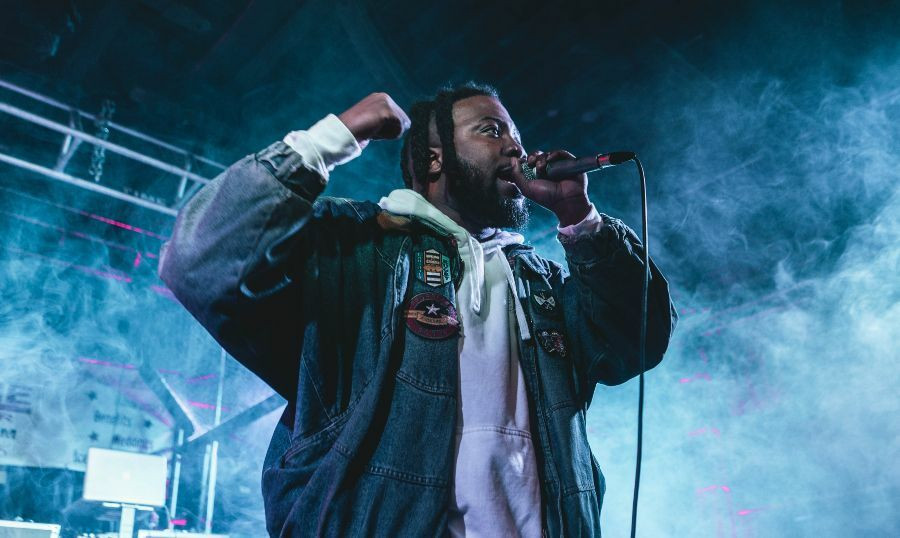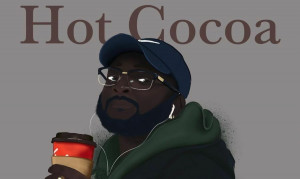Born in Montreal and raised in Ottawa, City Fidelia is one of five children raised by Haitian parents. He got his name, "City", from his neighbour, who used to call him "City Boy" because he always wanted to stay in the neighbourhood. Another friend told him his last name sounded like an artist’s name, and so he put the two words together. “It can be translated to being loyal to my city, Ottawa, which I have a special connection to,” Fidelia says of his moniker. This special relationship motivates him to give back to his community, by providing employment in his studio for other Black artists in the city, as well as studio time at lower rates than most other professional studios in Ottawa. His recent (January 2021) hire as CHUO 89.1 FM's program director advances his goal of giving back. “I want to use this opportunity to provide more jobs to people of colour in the entertainment industry,” Fidelia says. I spoke to the up-and-coming artist about giving back, finding his purpose, and chasing his dreams.
Inspired by his musician father, a bass player whose live shows he would frequent as a child, City Fidelia began writing music when he was just eight years old. After finishing high school, Fidelia went on to Carleton University where he initially studied law and Criminology, before deciding to drop out and chase his dream. “Music is just something I loved and always felt like something I was meant to do,” states Fidelia of the decision. “I love music because it enables me to express myself and connect with people in a different way.” Although his parents supported the decision, they didn't want him to drop everything for his art. “But at the end of the day, I understand parents just want their kids to be okay." acknowledges Fidelia, "and now, I’m in a position where I can say I'm OK and they're happy for me.”
While the COVID-19 pandemic continues, Fidelia has spent quality time connecting with his family and other artists. “I honestly believe COVID helped my career blossom and I was able to take some time and really think about what I wanted to do," says Fidelia. "I hope that people suffering from the pandemic can come out of it stronger." Of his daily routine, Fidelia says, “I wake up in the morning, attend meetings, go to the radio station and then go to my studio to work with artists there." A large part of his creative process is based on focusing on ideas he wants to discuss and then trying to find sounds that help express those thoughts. “Sometimes I get a beat, watch a movie, or hear a line that inspires me to write," Fidelia explains. "I often turn conversations with friends into songs." When it comes to creative blocks he takes a more relaxed approach. "I just take a break, allow myself to sit back and enjoy life a little bit, and try not to force things too much,” Fidelia offers.
Fidelia’s music is always inspired by his life experiences. “I am a man of the people and a conscious artist,” asserts Fidelia. "When I create music, my goal is to connect with, and heal as many people as possible through my music.” In terms of his life experience, Fidelia grew up in Ottawa’s Chinatown surrounded by Asians who grew up on Hip-hop culture and music. Being different in Ottawa wasn’t always a great experience. “Growing up, the police would come around and bother kids often, and as a Black individual, I knew it was because of our skin colour,” Fidelia states. According to Fidelia, the cops would follow him around when he was driving, and he also remembers one of his cousins being wrongfully charged over the theft of a car in the neighbourhood. “I definitely had my issues with the cops but times are different now,” says Fidelia, although he insists that it's time for the police to be provided with training to help them enforce the law towards Black people equitably.
"I’m a P.O.C. with a P.O.V. can’t silence me, no more enslaving me, V.V.S. is only time I freeze."
-City Fidelia, (Drugs and Loaded Weapons 2021)
These are City Fidelia’s favourite bars from his single entitled “Drugs and Loaded Weapons,” released on February 18th and dedicated to Black History Month. “It's letting the police and anybody in power know that I'm a Black individual with a point of view," says Fidelia of the urgent lyrics. "You can no longer belittle me because we’re in a position where we can speak and have a voice.” The song celebrates Black people’s achievements while also recognizing the violence, dehumanization, and the general subjugation they have experienced throughout history. It is a scathing account of police brutality. “I wrote the song after the George Floyd incident but didn't want to release it immediately, says Fidelia, at first using the song as an outlet to express his feelings of frustration. "As months passed, I felt the song could serve as a reminder for people that the fight for justice isn't over, and it was a way to remember what happened to George Floyd while recognizing his family's suffering isn't over either.”
Fidelia thinks Black History Month 2021 is the right time to release the song and commemorate the lives of George Floyd, Rayshard Brooks, Breonna Taylor, and other Black people who've lost their lives to police brutality and anti-Black racism. That said, Fidelia feels that Black History isn’t limited to a month. “Black people do so many amazing things every day that Black History Month could be all year,” Fidelia adds. Sharing his thoughts on Black Lives Matter, Fidelia sees these sorts of justice movements as essential. “I think it's beautiful to see people join in speaking for the voiceless because not everybody is brave enough to do it.” Along with a music video (shown below), there's also merchandise and a photo contest related to the single.
“God has a plan for everybody and I'm happy with my career because I think it's where I'm supposed to be," Fidelia assures me before adding, "the only thing I struggle with is having the money to do all the things in my head while making sure that everyone around me is okay.” Another challenge Fidelia points out recording contracts that don't favour the artist. “I find that most of the time contracts aren't made to support the creator, and it’s only fair for the creator to have ownership of their intellectual property,” he explains. However, Fidelia does still see the potential room for growth in Canada with an endless supply of emerging talent. “We have great Canadian artists like Drake and the Weeknd as well as a nice grant system that provides support for artists," enthuses Fidelia. "I'm here to watch it grow.”
His advice for would-be Black artists or songwriters is to create their own path. “I think everyone's journey is different, and they have to accept the ups and downs that come with it," advises Fidelia, who also shares some non-music industry wisdom in the form of his life philosophy. “Treat people the way you want to be treated, and always visualize yourself achieving whatever you want because it's possible.” As an artist who appears grateful for his opportunity to both give and receive, it's no surprise that City Fidelia insisted on thanking his fans for getting him to a point where he could support other Black businesses and artists. “I would be nowhere without them,” Fidelia graciously mentions.
To that point, Fidelia is working on his album for a released date later this year while also planning to start a label that supports other aspiring artists. Fidelia's focus seems to always be on making the kind of thought-provoking music that gets nominated for a Grammy or Polaris Award, while also helping to build an infrastructure for the music industry in his city. “I want to set something up for the younger kids, so they don't need to leave the city to accomplish their dreams," envisions Fidelia. With close to 3000 written songs and performances in nearly 100 shows, City Fidelia's unique voice, story, perspective, and sound, makes him a Black Canadian artist to watch and root for.

 By
By 


